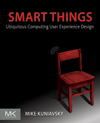Last week Molly and I were in San Diego for O'Reilly's Emerging Technology Conference, where Molly and Michael Kieslinger's did a highly-lauded Fluidtime presentation. I'm sure it's been overblogged and superwikied, so I won't belabor the details, but I did have a couple of observations of the trends I noticed in the conference, which could be trends in emerging tech, or maybe just this group.
- Social Networks as access control. With the practice of discussing social networks as the next big thing kind of coming to a close, people are starting to discuss what they're for, after they've been populated. A number of dicussions basically boiled down to the idea of social networks as the new access control list. Social networks allow me to use a quick shorthand for who should see what of my information.
- Document sharing was also big, with various groups presenting all kinds of clever ways of interchanging documents, often coupled with social network access control. So look for new services such as Flickr (from the fine folks at Ludicorp, who would are in my social network). Personally, I want something to merge BitTorrent, Orkut and Allmusic with iTunes so that I can listen to the stuff that my friends have in their music folders.
- Geeks working for the army. This was a weird one, but there were at least three sessions (from iRobot--the Roomba people, JC Herz--of Joystick nation, and icosystems--a splinter of the Santa Fe Institute studying emergent behavior) that had people really focused on, and being funded by, military applications. That's not surprising, since a lot of tech gets dough from the Army, but it was surprising at this conference. There seemed to be little introspection or remorse about it, though there was some guilt. As much as I believe in the inevitability of conflict and that keeping our soldiers safe is important, these technologies worry me. I believe there's currently a military culture that aims to disassociate itself from the human side of war and treat war as a hygenic process, where reducing the messiness makes it somehow less contagious. I think that's a bad metaphor, one that's gotten us into trouble in Iraq and will again. Creating technology that further mediates the process makes it easier to avoid the learning that's important to creating peace.
That last concern apart, it was a great conference, if only for all the hanging out in the lobby bar. I think having it in San Diego, away from the Bay Area where people felt comfortable and could leave at night, was a good one. It made everyone stew in the same juices for a couple of days and although I'm now exhausted from all the socializing, it was well worth it. I will now know to prepare for any conference that has lots of social network and mobile technology participants: the combination of highly social people with lots of cutting-edge mobile technology in a town that no one really knows means dinnertime decisionmaking paralysis on a scale like never before.
Oh, one last random thought I had there, which mixes scientific metaphors in an attempt to explain Howard Dean's success and subsequent failure: it was because of a combination of first mover advantage amplified by a highly networked environment (the media). It seems analagous to a forest fire in August. A spark in a fuel-rich system that has no inherent controls, it reacts strongly, but the strength of that reaction can distort any examination of the underlying landscape. When the initial fuel burns away, it reveals the layer beneath it, which may or may not be able to support further growth.




No, I don't think that Dean started too early it's just that people expected that the amount of online discussion to be proportional to the amount of support in the population at large, forgetting that bloggers, journalists, the delegates and the electorate are very different populations, with very different desires and loyalties. Now we may be experiencing a backlash against that with an anti-Dean movement, as people try to compensate for their embarassing early support of Dean with an equally rash abandoning of him, but I think that there's a much better understanding of the underlying shape than there was when it was just an online campaign.
Just to play devil's advocate regarding your Howard Dean explanation -- does that mean he started too early?